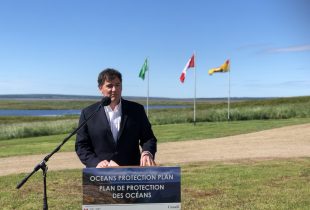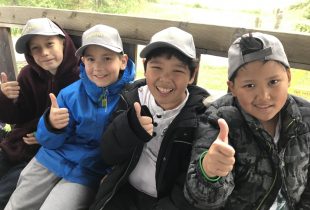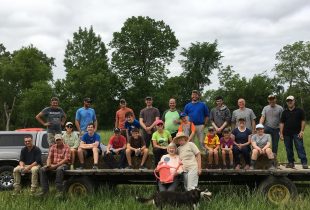Small voices speak loudly for conservation
Students stole the show at Rescue Our Wetlands campaign launch

Three small voices were all it took to interrupt the lives of more than 150 people. But this was a welcome interruption. You might even call it a wake-up call – one that put the future of wetlands and the health of our environment in a whole new perspective.
The Rescue Our Wetlands campaign launch could have been an ordinary announcement, a collection of speeches from dignitaries and people like me. Instead, three Grade 3 students stole the show. They spoke with an enthusiasm and passion that made everyone stop and listen. Really listen.
It was a chilly day in early October. Board members from Ducks Unlimited in Canada, the United States and Mexico had gathered in Calgary for the public launch of a monumental new conservation campaign: Rescue Our Wetlands. Members of the media, as well as a few members of the public who were hearty enough to venture out following the season’s first dusting of snow, gathered around an outdoor stage at the Bow Habitat Station.
When Emma, Nadine and Taeghan trotted up on stage, grasping their speaking cards in their tiny hands, you could feel the mood change. On behalf of their school – and on behalf of kids like them across the country – they’d come to share why wetlands and conservation matter.
Standing bravely before the crowd, each read a personal account about the wetland located on their school’s property. They shared what they were learning. They talked about their favourite creatures. They explained how the wetland is teaching them to use all of their senses in understanding science and the natural world.
Perhaps it was the genuine excitement echoing through their voices, or the impressive knowledge demonstrated in their descriptions of damselfly nymphs and water beetles that had us all mesmerized. Whatever it was, the message came through loud and clear: kids care about wetlands and the environment. And they need us to care, too.
So, are we listening to our kids? Are we recognizing and responding to their curiosity about the environment?
We can learn a lot from the next generation of conservation leaders. Young people can be powerful agents of change. They speak truthfully and act genuinely, which is what makes their discoveries about wetlands and wildlife both endearing and enlightening. With kids, what you see is what you get. And what we’re seeing is that nature, when given the chance, still inspires and excites them. The electronic era of cell phones, computers and video games has not completely silenced the call of the wild. Emily, Nadine and Taeghan are inspiring proof. Their small voices are speaking loudly for conservation.
Have you been inspired by a young conservationist? Share your stories that demonstrate how young people are standing tall as ambassadors for water, wildlife and the natural world they’re poised to inherit.
Their stories:

© DUC
Emma: Royal Oak School’s fascination with the local wetland all began in the fall of 2010 when our school opened. Ever since then, the wetland has become our wild classroom. I have a special connection because my house borders the wetland. To my family it’s like a second backyard, a wild backyard. I have observed ducks, snowshoe hare, moose, coyotes and many more large and small critters while watching from my deck or walking through the wetland. We always have lots of ducks and sometimes geese nesting at the wetland. Once there was even a lovely white swan. I also sadly observed a mother duck lose all of her baby ducks to a coyote. For me the wetland is a magical place; I try to look after it by looking out for the animals and letting people know how important it is.

© DUC
Nadine: I have been visiting the local wetland with my school since I was in Kindergarten. I have learned that wetlands are super important places for ducks, geese and other kinds of wetland birds. As well, we have gone down and observed the small critters in the water. It is super fun. We put wetland water into buckets and watch, seeing everything from dragonfly nymphs to water beetles. All of these creatures are important and connected to the health of the wetland. Our wetland use to be much bigger; there was a prairie hill covered in native plants, and a grove of large popular trees. Unfortunately, more houses were built leaving less room for plant and land animals like the pocket gopher. Luckily our neighborhood has many wetlands where hopefully these land animals were able to find new homes.

© DUC
Taegan: You can’t believe all the cool, fun things we do at the local wetland. We use our senses to take it all in. We write, draw, listen, smell, touch and sometimes we are completely wowed by what we see. In the spring when we were collecting plant samples for the school herbarium we stopped to watch damselfly nymphs climbing out of the water, they were in the process of changing into adults. We listened to chickadees chirping and watched mallard ducks landing on the pond. I feel lucky to live in a neighborhood that has many wetlands. Visiting the local wetland makes me happy and makes me want to take care of wild places.



